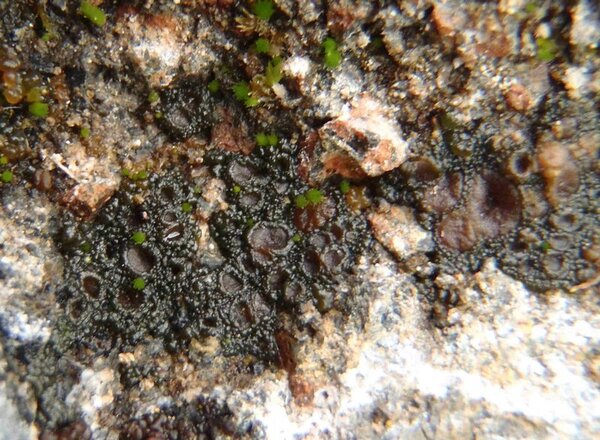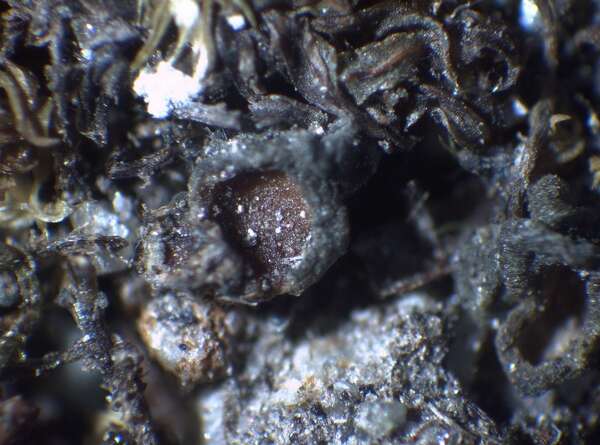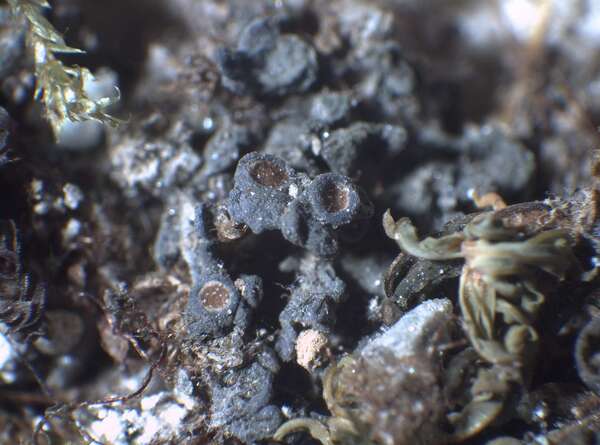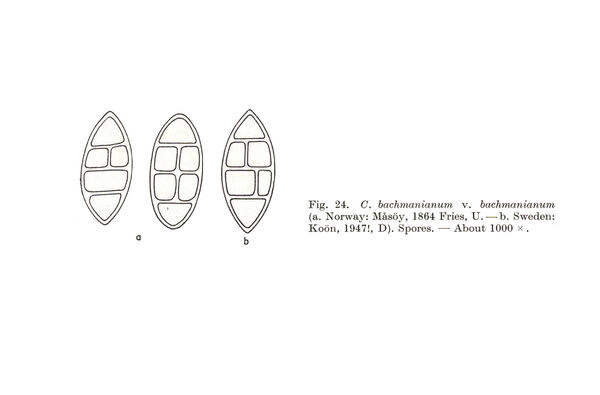Enchylium bachmanianum (Fink) Otálora, P.M. Jørg. & Wedin
Fungal Divers., 64, 1: 286, 2013. Basionym: Collemodes bachmanianum Fink - Mycologia, 10: 236, 1918.
Synonyms: Collema bachmanianum (Fink) Degel.; Collema bachmanianum var. millegranum Degel.
Distribution: N - Lomb.
Description: Thallus foliose, homoiomerous, gelatinous and strongly swollen (200-700 µm thick ) when wet, loosely adnate, dark olive-green to black, 2-6 cm wide. Lobes 2-4(-6) mm wide, radiating, concave to flat, swollen in terminal parts, sometimes with many isidia-like warts or lobules; lower surface paler, with scattered to dense white hapters. Upper and lower cortex absent. Apothecia common and often numerous, lecanorine, sessile and constricted at base, 1.5-3(-4) mm across, with a strongly concave to flat, reddish brown disc, and a coarsely crenulate to lobulate, usually persistent thalline margin. Thalline exciple ecorticate or pseudocorticate in lower part; proper exciple thin, euthyplectenchymatous; epithecium brownish; hymenium colourless, 100-135 µm high, I+ blue paraphyses simple or sparingly branched, c. 2 µm thick at mid-level, the apical cells clavate to subglobose, up to 6.5 µm wide; hypothecium colourless to yellowish, I+ blue. Asci 8-spored, cylindrical-clavate, the apex strongly thickened, the apical dome K/I+ pale blue, with a downwardly projecting K/I+ deep blue tubular structure. Ascospores submuriform, mostly with 3 transverse septa and 1(-2) longitudinal septa, at first hyaline, then pale yellow or brown, ellipsoid with usually pointed ends, (20-)26-32(-36) x 8.5-15 µm. Pycnidia absent. Conidia formed inside the thallus, 10.5-13 x 2-3 µm. Photobiont cyanobacterial (Nostoc, the cells in long chains). Spot tests: all negative. Chemistry: without lichen substances. Note: a mainly arctic-alpine, circumpolar species found on calciferous or base-rich siliceous soil near or above treeline; restricted to the Alps in Italy. Italian samples belong to var. millegranum (Degel.) M. Schultz & McCune.
Growth form: Foliose, broad lobed
Substrata: soil, terricolous mosses, and plant debris
Photobiont: cyanobacteria, filamentous (e.g. Nostoc, Scytonema)
Reproductive strategy: mainly sexual
Commonnes-rarity: (info)
Alpine belt: extremely rare
Subalpine belt: extremely rare
Oromediterranean belt: absent
Montane belt: absent
Submediterranean belt: absent
Padanian area: absent
Humid submediterranean belt: absent
Humid mediterranean belt: absent
Dry mediterranean belt: absent

Predictive model
Herbarium samples


Curtis Randall Björk – CC BY-SA 4.0
Clearwater Valley, BC, First Canyon Uplands Date: 2011-05-05: On cliffs of pillow basalt on south-facing slope, dry, lightly forested


P.L. Nimis; Owner: Department of Life Sciences, University of Trieste
Herbarium: GZU - Lichenes Alpium (280)
2003/04/28
apothecium
Growth form: Foliose, broad lobed
Substrata: soil, terricolous mosses, and plant debris
Photobiont: cyanobacteria, filamentous (e.g. Nostoc, Scytonema)
Reproductive strategy: mainly sexual
Commonnes-rarity: (info)
Alpine belt: extremely rare
Subalpine belt: extremely rare
Oromediterranean belt: absent
Montane belt: absent
Submediterranean belt: absent
Padanian area: absent
Humid submediterranean belt: absent
Humid mediterranean belt: absent
Dry mediterranean belt: absent

Predictive model
| Herbarium samples |


Curtis Randall Björk – CC BY-SA 4.0
Clearwater Valley, BC, First Canyon Uplands Date: 2011-05-05: On cliffs of pillow basalt on south-facing slope, dry, lightly forested


 Index Fungorum
Index Fungorum
 GBIF
GBIF



